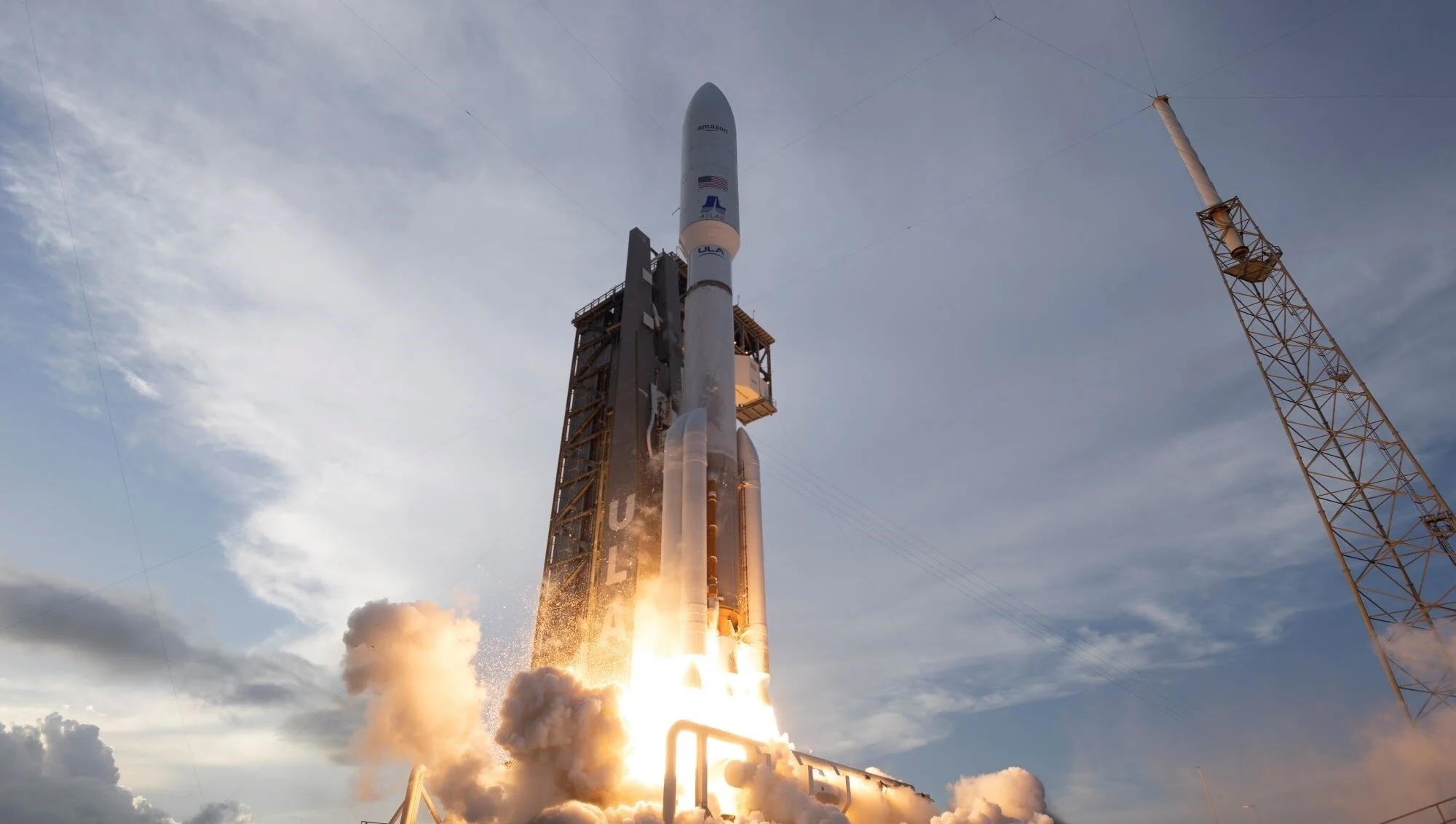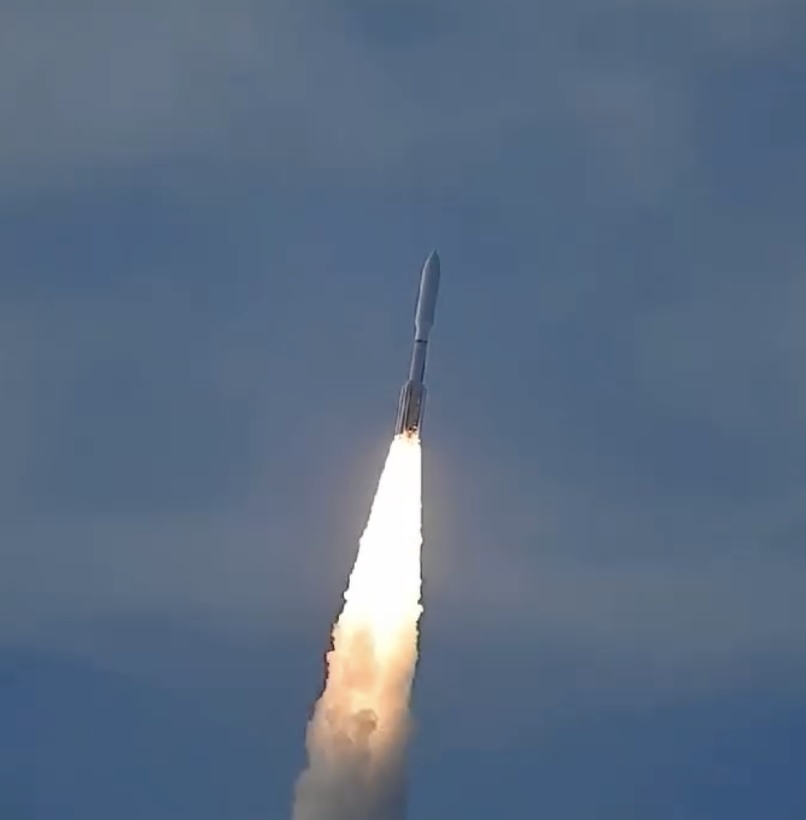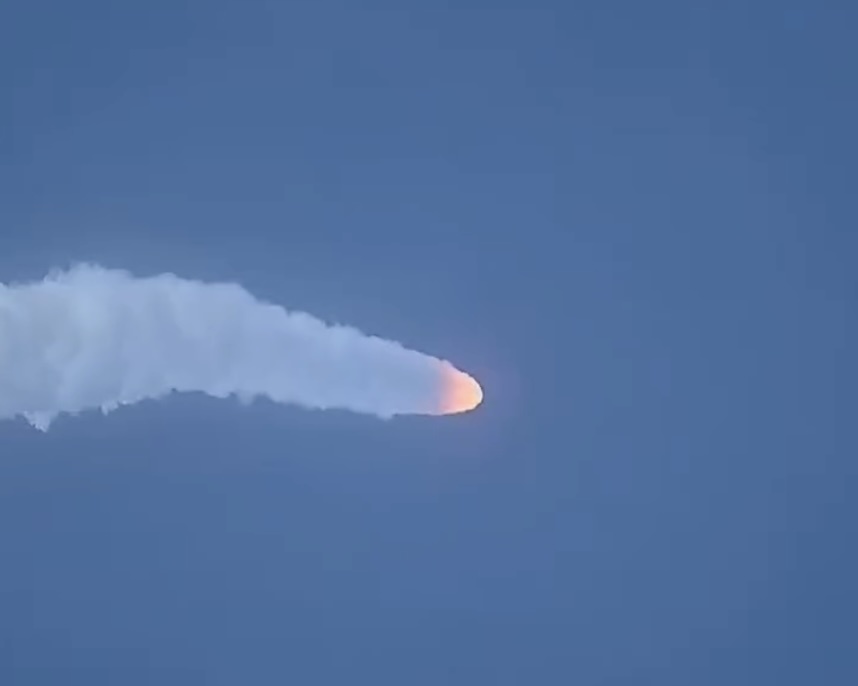4.04.2025
Amazons first Project Kuiper satellites to launch atop ULA Atlas V with 5 rocket boosters
United Launch Alliance crews are targeting noon EDT April 9 to launch an Atlas V rocket carrying Amazon's first 27 production satellites for the company's planned $10 billion Project Kuiper internet constellation.
The Atlas V will ascend into low-Earth orbit from Launch Complex 41 at Cape Canaveral Space Force Station. The mission — named KA-01 for Kuiper Atlas 1 — has a three-hour launch window.
And Amazon reports this Project Kuiper satellite payload will represent the heaviest payload ever flown on an Atlas V rocket — requiring five solid rocket boosters, its most powerful configuration.
Amazon is constructing a Project Kuiper complex at NASA's Kennedy Space Center, at the Launch and Landing Facility. A $120 million, 100,000-square-foot processing plant standing about 120 feet tall will prep Project Kuiper’s 3,200-plus satellites for launch from the Cape, with a $19.5 million, 42,000-square-foot flight hardware building standing alongside.
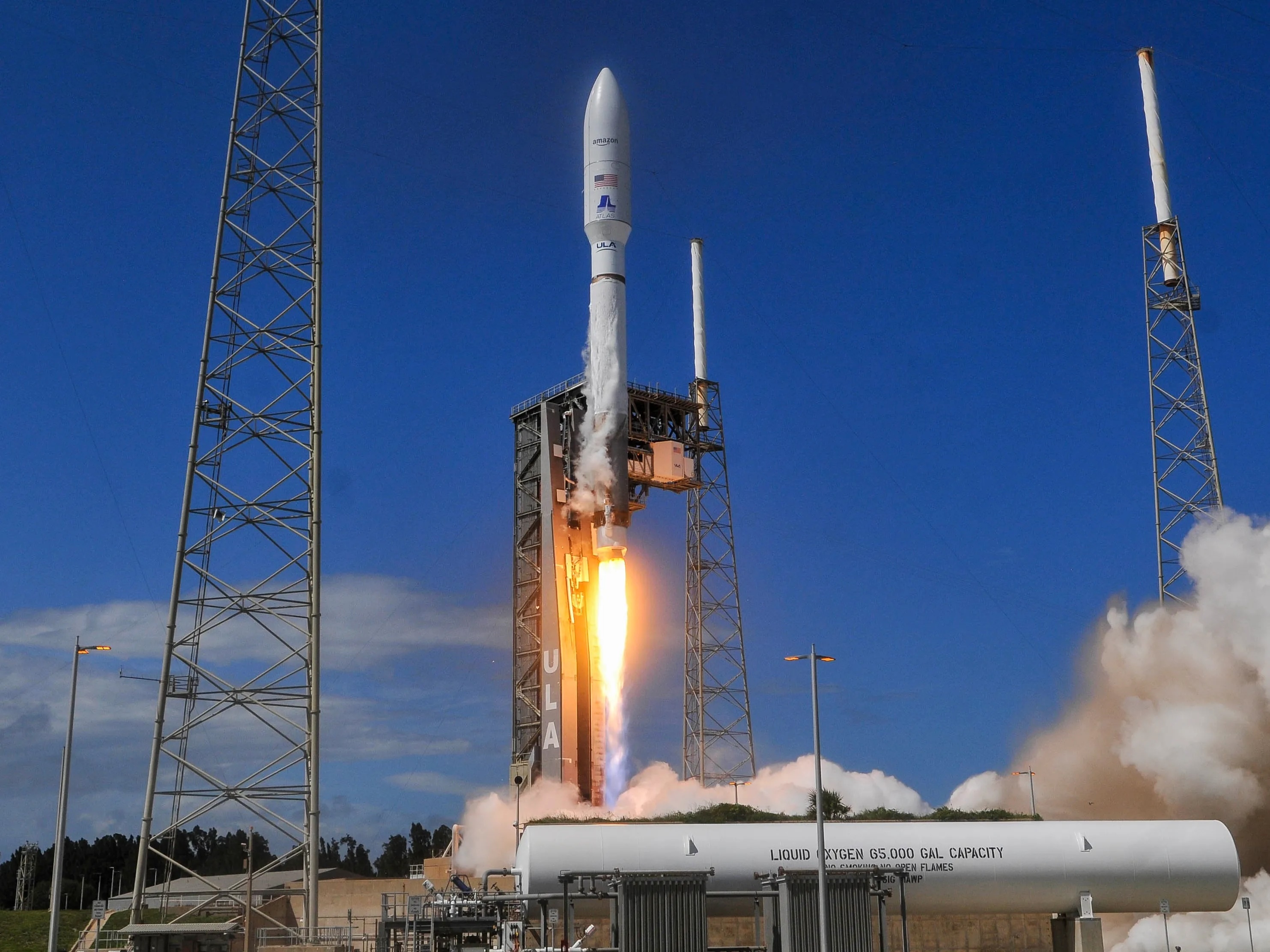
"Project Kuiper will deliver high-speed, low-latency internet to virtually any location on the planet, and we expect to begin delivering service to customers later this year," an Amazon press release said.
More than 80 ULA, Blue Origin, SpaceX and Arianespace rockets will be needed to carry these first-generation satellites. In the coming years, ULA will deliver seven Atlas V launches and 38 launches on larger Vulcan rockets for the program.
“We’ve designed some of the most advanced communications satellites ever built, and every launch is an opportunity to add more capacity and coverage to our network,” Rajeev Badyal, vice president of Project Kuiper, said in the press release.
“We’ve done extensive testing on the ground to prepare for this first mission, but there are some things you can only learn in flight, and this will be the first time we’ve flown our final satellite design and the first time we’ve deployed so many satellites at once," Badyal said.
"No matter how the mission unfolds, this is just the start of our journey, and we have all the pieces in place to learn and adapt as we prepare to launch again and again over the coming years," he said.
The April 9 inaugural launch should deploy satellites 280 miles above the Earth's surface. Afterward, the satellites' electric propulsion systems will transport them to assigned orbits 392 miles up.
As a first step in October 2023, an Atlas V launched Amazon's prototype KuiperSat-1 and KuiperSat-2 satellites from Cape Canaveral Space Force Station. The 27 satellites poised for liftoff represent significant upgrades.
"We have improved the performance of every system and sub-system on board," the press release said.
Quelle: Florida Today
----
Update: 7.04.2025
.
Amazon prepares to launch first full batch of Project Kuiper satellites
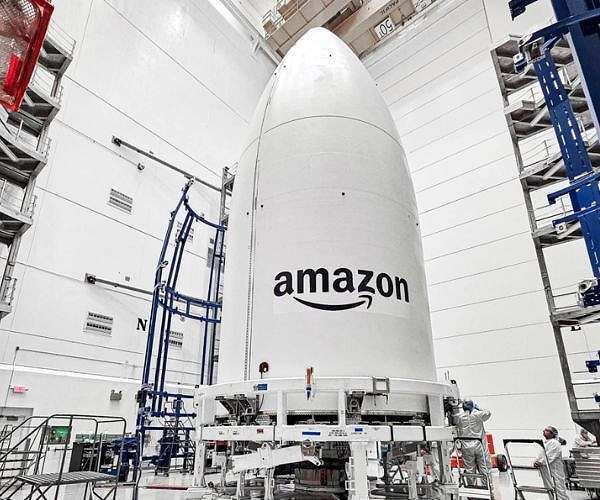
Amazon's Project Kuiper said Wednesday it is planning to launch 27 satellites April 9 from Cape Canaveral Space Force Station, Florida.
It is the project's first full batch of Internet connection satellites and will be launched by United Launch Alliance.
According to Project Kuiper their first-generation satellite system will put a total of 3,200 into orbit in the first constellation, using more than 80 launches to deploy them.
"We've done extensive testing on the ground to prepare for this first mission, but there are some things you can only learn in flight, and this will be the first time we've flown our final satellite design and the first time we've deployed so many satellites at once," said Project Kuiper's Rajeev Badyal in a statement.
The project's ultimate goal is to provide end-to-end connectivity that will deliver Internet service to virtually any location on Earth.
According to Project Kuiper, service will start for consumers later this year.
Amazon's Federal Communications Commission license for Project Kuiper requires half the satellite constellation to be deployed by July 2026. The remainder must be deployed by July 2029.
"No matter how the mission unfolds, this is just the start of our journey, and we have all the pieces in place to learn and adapt as we prepare to launch again and again over the coming years," Badyal's statement said.
Amazon said the satellites going into orbit April 9 are significantly upgraded from the two prototypes first launched in 2023.
The upgrades include better phased array antennas, solar arrays, processors, propulsion and optical inter-satellite links, according to Amazon.
The payload scheduled for the April 9 Atlas V rocket launch will be the heaviest that rocket has ever flown. It will require the most powerful configuration for the rocket, which includes five rocket boosters plus the main booster.
Seven more Atlas launches are planned for coming years in addition to 38 launches on the larger Vulcan Centaur rocket.
Quelle: SD
----
Update: 9.04.2025
.
ULA Atlas V launch tonight: Everything to know about Amazon satellite launch from Cape Canaveral
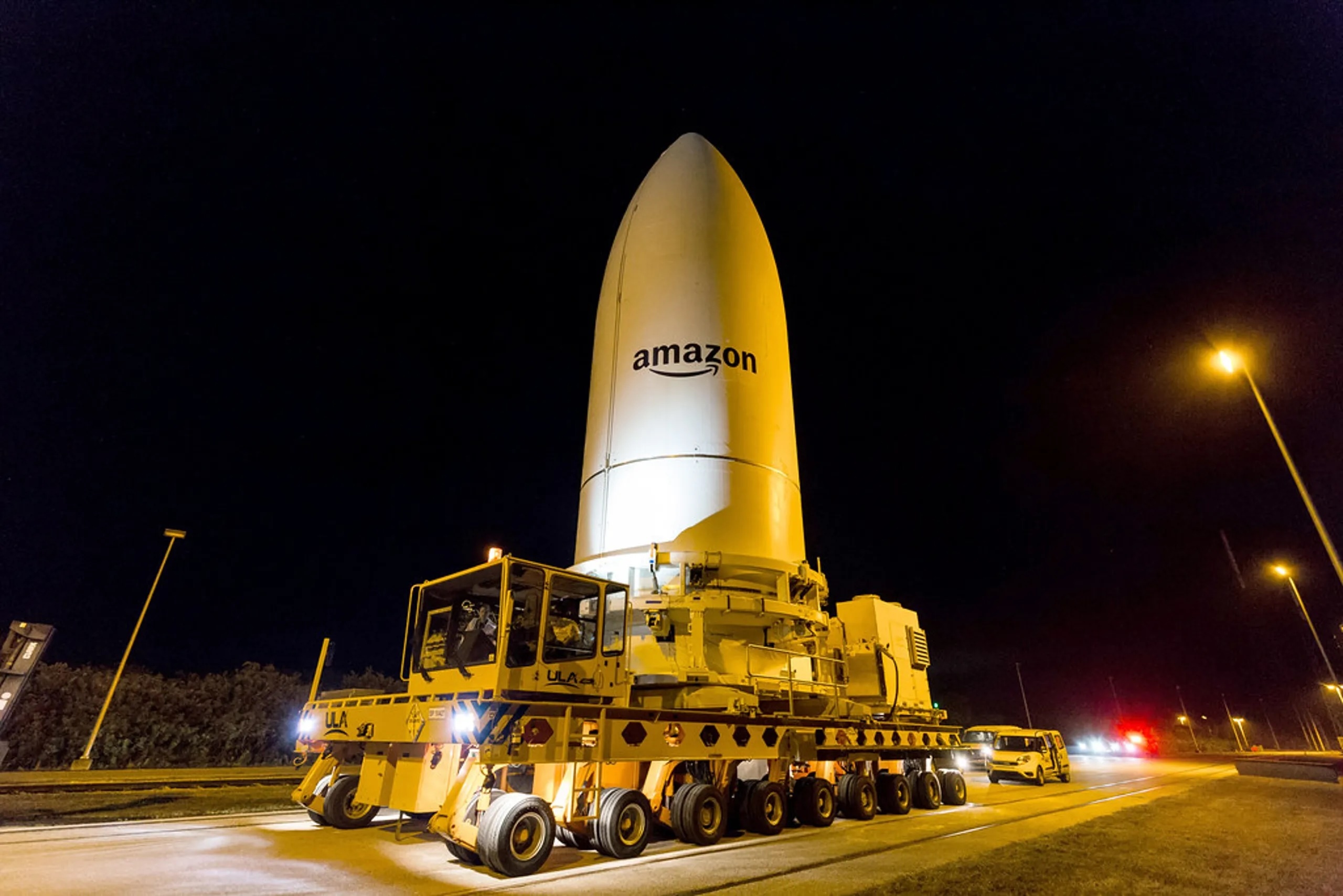
It's launch day for Amazon's first-ever payload of 27 production satellites for the ecommerce giant's future Project Kuiper internet constellation!
United Space Alliance crews are targeting 7 p.m. EDT to launch a 205-foot Atlas V rocket — powered by five side rocket boosters — from Launch Complex 41 at Cape Canaveral Space Force Station.
"Project Kuiper is Amazon’s low Earth orbit satellite broadband network. Its mission is to provide fast, reliable internet to customers around the world, including those in unserved and underserved communities, using a constellation of more than 3,200 LEO satellites," the ULA mission page said.
The Atlas V will soar skyward along a northeasterly trajectory, and no Central Florida sonic booms should occur. However, the Space Force's 45th Weather Squadron pegged the odds of favorable launch weather at only 55%, citing cumulus clouds and liftoff winds.
"Of note, recent guidance indicates the peak windspeeds are expected Wednesday afternoon and should trend downward during the window," the squadron's forecast said.
Quelle: Florida Today
----
Update: 27.05.2025
.
Atlas V precisely delivers the first grouping of operational broadband satellites for Amazon’s Project Kuiper constellation.
Cape Canaveral Space Force Station, Fla., (April 28, 2025) – A United Launch Alliance (ULA) Atlas V rocket carrying the Kuiper-1 mission for Amazon’s Project Kuiper lifted off on April 28 at 7:01 p.m. EDT from Space Launch Complex-41 at Cape Canaveral Space Force Station. The Kuiper 1 launch marks the beginning of full-scale deployment of the Kuiper constellation and a new chapter in the commercial launch industry as Amazon partners with ULA to deliver a majority of its advanced satellites in low-Earth orbit (LEO).
“This launch is an incredible milestone in Amazon’s ambitious initiative to provide fast, reliable broadband service to unserved and underserved communities around the world,” said Gary Wentz, ULA vice president of Government and Commercial Programs. “We have worked diligently with the Project Kuiper team to place this important mission on orbit and are grateful for the opportunity to continue building upon this dynamic partnership.”
In addition to the successful launch of two Kuipersat prototypes in 2023 and another seven launches aboard Atlas V, Project Kuiper will leverage the next-generation Vulcan rocket for 38 high-cadence, rapid-fire launches, positioning ULA to deliver more than half of the constellation’s more than 3,200 satellites through the world’s largest commercial launch agreement.
“This launch marks the first step towards the future of our partnership and increased launch cadence. We have been steadily modifying our launch facilities in Cape Canaveral to support the capacity for future Project Kuiper missions in a manner that will ultimately benefit both our commercial and government customers as we endeavor to save lives, explore the universe and connect the world,” said Tory Bruno, ULA president and CEO. “The addition of a second launch processing capability allows for dual, simultaneous launch processing between both integration facilities seamlessly.”
Quelle: ULA

